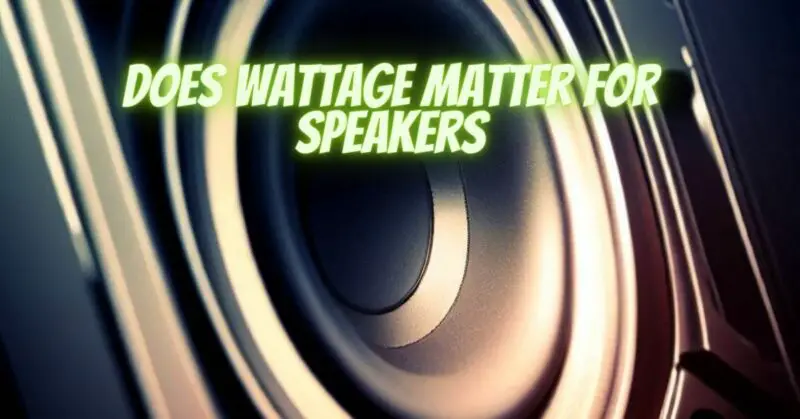The relationship between speaker wattage and performance is a crucial consideration when building an audio system. While wattage is often associated with how loud a speaker can get, it’s essential to understand that the wattage rating alone doesn’t determine a speaker’s overall performance. Let’s explore the intricate interplay between wattage and speaker performance to grasp how these factors influence each other.
Wattage and Speaker Performance: The Connection
What is Speaker Wattage?
Speaker wattage refers to the amount of power an amplifier can deliver to a speaker. It’s commonly measured in watts and is a critical factor in determining how effectively a speaker can reproduce sound.
Speaker Power Handling:
Speakers are rated for their power handling capacity, which indicates the maximum amount of power they can handle without being damaged. This rating is usually expressed as a range (for example, 50-100 watts) to account for different types of audio signals and dynamic peaks.
Impact on Performance:
While wattage does play a role in speaker performance, it’s just one piece of the puzzle. Here’s how it can impact performance:
Volume Levels:
Higher wattage amplifiers can drive speakers to higher volume levels without distortion. However, it’s crucial to remember that perceived loudness doubles with every 10 dB increase, which means doubling the wattage won’t necessarily result in a significant volume boost.
Clarity and Dynamics:
Excessive wattage can push a speaker beyond its power handling capacity, leading to distortion or even damage. Operating within a speaker’s power handling range ensures clarity, accurate reproduction, and better dynamics.
Durability:
Using an amplifier with wattage significantly higher than a speaker’s power handling can strain the speaker’s components, potentially leading to wear and tear over time.
Considerations Beyond Wattage:
Speaker Sensitivity:
Speaker sensitivity, measured in decibels (dB), indicates how efficiently a speaker converts electrical power into sound. Higher sensitivity speakers require less power to produce the same volume as lower sensitivity ones.
Room Acoustics:
The acoustics of your listening space significantly impact how sound travels and is perceived. A smaller room might require lower wattage to achieve desired volume levels, while a larger space might necessitate higher wattage.
Music Genre and Use Case:
Different types of music and audio content have varying dynamic ranges. Classical music with subtle nuances might require different power handling than heavy rock with intense peaks.
Quality and Matched Components:
Using high-quality components and matching the amplifier and speakers appropriately contributes to optimal performance. A mismatched setup, even with correct wattage, can result in compromised sound quality.
While wattage rating does impact speaker performance to some extent, it’s only one of many factors that influence how a speaker sounds and behaves. The key is to strike a balance between wattage, power handling, sensitivity, and overall system compatibility. It’s essential to choose components that complement each other to achieve the desired sound quality, volume levels, and overall listening experience. Remember, wattage is part of the equation, but the harmony of the entire system contributes to the speaker’s true performance capabilities.


